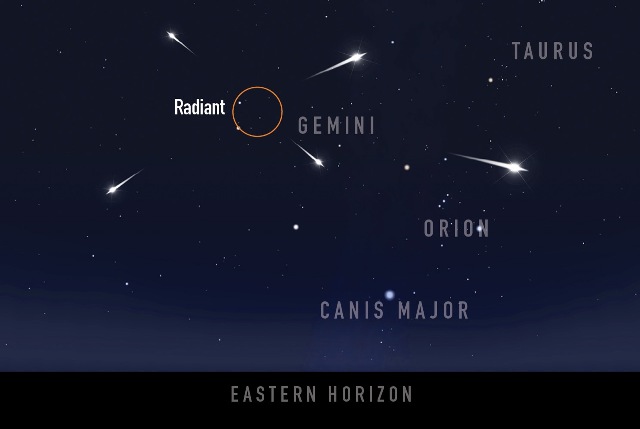Dec 11 2015
From 13 to 15 December, weather permitting, skywatchers across the world will be looking up as the Geminid meteor shower reaches its peak, in potentially one of the best night sky events of the year.
 A diagram showing how the meteors will appear to emanate from a radiant in the constellation of Gemini on the nights of maximum activity. Credit: Greg Smye-Rumsby / Astronomy Now
A diagram showing how the meteors will appear to emanate from a radiant in the constellation of Gemini on the nights of maximum activity. Credit: Greg Smye-Rumsby / Astronomy Now
At its peak and in a clear, dark sky, tens of 'shooting stars' or meteors may be visible each hour (the theoretical maximum under ideal conditions is about 120 an hour). Meteors are the result of small (mm- to cm-sized) particles entering the Earth's atmosphere at high speed, burning up and superheating the air around them, which then shines as a characteristic short-lived streak of light. In this case the debris is associated with the asteroidal object 3200 Phaethon, which many astronomers believe to be an extinct comet.
The meteors appear to originate from a 'radiant' point in the constellation of Gemini, hence the name Geminid. By 0200 GMT the radiant will be almost overhead as seen from from the UK, making it ideally placed for observers. As a bonus, the Moon will not be present in the sky for most of the night during the period of maximum activity, so the prospects for a good view of the shower are excellent. And unlike many astronomical phenomena, meteors are best seen without a telescope and are perfectly safe to watch with the naked eye.
Meteors in the Geminid shower are less well known than those at other times of year, probably because, in the UK at least, the weather in December is less reliable. But those who brave the cold can be rewarded with a fine view. In comparison with other showers, Geminid meteors travel fairly slowly, at around 35 km (22 miles) per second, are bright and have a yellowish hue, making them distinct and easy to spot.
According to the International Meteor Organisation, which coordinates meteor observations, the Geminids meteor shower will peak at around 1800 GMT on 14 December, and the greatest activity is spread over a period lasting a day or more. In recent years, the shower has also become more intense as the gravitational influence of Jupiter and Saturn shifted a denser debris stream to be closer to the Earth.
Meteor watchers may want to look at different times during the night. Because of the rotation of the Earth, in the early evening, the edge of the cloud of debris that makes up the Geminids skims the atmosphere, leading to a few 'Earth grazer' meteors that can have long paths across the sky. Later on in the night, observers are looking up as their part of the Earth is facing right into the debris, so the number of meteors is usually much higher.
Prof Martin Barstow, President of the Royal Astronomical Society, encourages people to go and take a look, saying: “A good meteor shower is a spectacular sight. If you have clear skies, there are few better and easier ways to get an impression of the dynamism of the universe we live in, and how the Earth is directly connected to events in the rest of the Solar System.”
Mark Bailey, Director of the Armagh Observatory in Northern Ireland, added: "Unusually, the parent body for the Geminid meteors, namely Phaethon, currently appears to be an asteroid. However, its association with the Geminids tells us that it must once have been actively releasing meteoroids, perhaps as recently as hundreds or several thousands of years ago. Observations of the Geminids from around the world are beginning to help astronomers to understand how Phaethon and objects like it evolve over time."